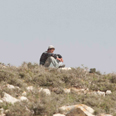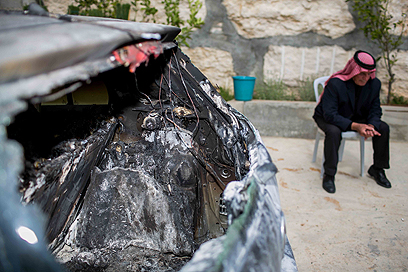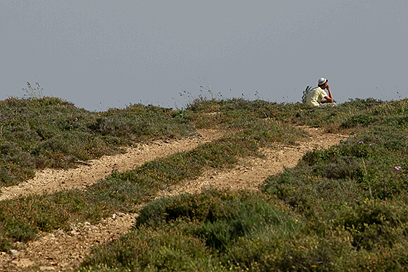
300 meters of loathing
Construction of outpost triggers tension, violence between settlers and Palestinian landowners; 'this is no place for frightened Jews,' says member of Hilltop Youth
A mere 300 meters separate the outpost of Nezah Benjamin and the Palestinian villages of Silwad and Dayr Jarir. The mountainous view is adorned with vineyards and olive trees, yet the pastoral exterior betrays a real combat zone.
Related stories:
- Security forces fear settlers' revenge
- Settlers throw stones, burn fields
- Israeli friends of Palestinian village
On one side there's a small group of settlers, defining themselves as hilltop youth, who established a new outpost on a hill overlooking Dayr Jarir and Silwad; and on the other there are the residents of the villages, whose blood boils at the view of the construction.
The conflict peaked in recent weeks as a series of skirmishes led to injuries, arrests and military intervention. A hut erected by the settlers was burned, as were 10 vehicles belonging to Palestinians. A Silwad resident was hospitalized after he was badly bruised by the settlers. A settler was hospitalized after a stone hit his head. IDF soldiers came in to intervene and resorted to riot control measures.
One Dayr Jarir landowner says his family was rudely awakened one night by smoke coming from the family vehicle, which the hilltop youth set on fire. The 14 children were led out through the back door, as the heavy smoke made breathing impossible. The youngest of the children, aged two, was hospitalized with smoke inhalation.

The torched vehicle at Dayr Jarir (photo: Ohad Zoigenberg)
Another man told Ynet, pointing in the direction of the settlements of Ofra and Amona, "We didn't want to fight them; they have always been our neighbors. We have never had any problems with them. The tensions date to the construction of the outpost two months ago."
A few hundred meters away, one of the Nezah Benyamin settlers was sat perched on a heap of rocks overlooking the terrain. As he was the only guard manning the outpost, one could perceive the nervous readiness in his movements each time he observed some movement at the pathway leading up to the hill. The list of unwanted guests is a legion: Palestinians, police, Civil Administration officials and even some of the residents of nearby settlements.

A hilltop youth at Nezah Benyamin (photo: Ohad Zoigenberg)
The Nezah Benyamin hilltop youths rarely speak to those outside their posse, members of the media included. They pass the time erecting a structure from old bricks lying at the site, use the pit for water, and sometimes talk on the phone, mainly to their comrades occupying nearby hilltops.
There are about 10 young men keeping vigil at the outpost, however recent developments, that include arrests and a hospitalization, mean three people at the most man the outpost's hastily assembled rampart at any given time.
"We set up the outpost to fulfill the verse 'you shall inherit the earth.' I was looking for a place with a beautiful view to set up my home, and I wound up on this hill. That landed me a restraining order, but I have never been involved in any 'price tag' acts," said Auerbach, blaming the violence and increased tension in the region on the Palestinians. "Following my expulsion the Jews, who understood the strategic importance of the place, came here and the Arabs began to harass them."
"Silwad Arabs burned a hut full of expensive items. They destroyed religious objects and books, came up here and threw stones at us," he further added. The military, he claimed, is also responsible for fermentation of tensions as it fails to keep the Palestinians away from the new outpost.
Unlike other villages, Silwad residents have no intention of keeping nightly vigil to guard themselves from 'price tag' vandalism. They resort to the legal services offered by the human rights group Yesh Din, and say they expect IDF to protect the village properly.
The settlers' aim, they say, is to instill fear with the local landowners so that they stop working the land and lose their livelihood.
The hilltop youth rejected the claims, saying they are the ones being attacked and made it clear they will not be deterred. "If you attack us, we'll defend ourselves and attack back. This no place for frightened Jews."
The area is becoming a hotspot for Friday rallies, where Palestinians and peace activists protest against the occupation and the separation fence. Both sides across the 300 meters are gearing for a struggle, however lengthy and violent.
Elior Levy contributed to this report
- Receive Ynetnews updates directly to your desktop










